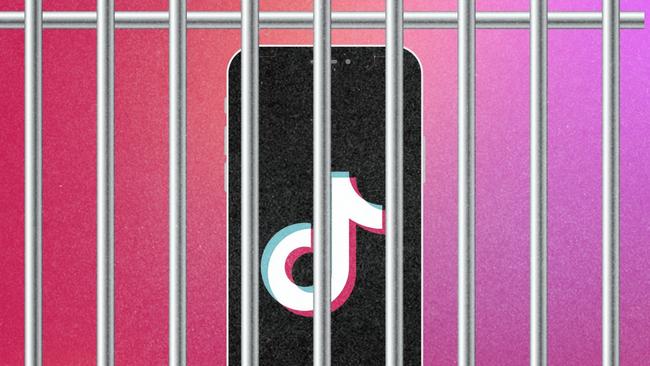TikTok Ban: What bill could mean for Meta, Snap, Amazon, Apple
The US has passed a bill that could ban the app. Here’s what to know about the bill and the broader impact on tech companies including Meta, Snap, Alphabet, Amazon and Apple.

The US House of Representatives on Wednesday approved a bill that would either force China-based tech giant ByteDance to sell TikTok or ban the short-video app in the US. While the effort faces an uncertain path in the Senate, the vote marks a major escalation of tensions between politicians and the social media platform with more than 170 million American users.
Here’s what to know about the bill and the broader impact on tech stocks, including Meta, Snap, Alphabet’s, Amazon and Apple.
Politicians call TikTok a national security risk
The bill would require Beijing-based ByteDance to divest TikTok within 165 days. If it doesn’t, TikTok would be banned from app stores in the U.S. The bill won approval in the House on Wednesday by a 352 to 65 vote.
Supporters of the bill say TikTok’s China-based ownership puts American’s personal data at risk. There are also concerns that TikTok could use the algorithms that recommend videos on the app to influence public opinion. The bill’s sponsors — Republican Rep. Mike Gallagher and Democrat Rep. Raja Krishnamoorthi — said in a news release that applications “controlled by foreign adversaries pose an unacceptable risk to U.S. national security.”
TikTok pushed back in a letter to House politicians on Monday, according to Axios. “As we have repeatedly explained to Congress, TikTok is not owned or controlled by the Chinese government,” wrote TikTok vice president of public policy Michael Beckerman. Private investors throughout the world are the company’s majority owners, he wrote.
Beckerman added that TikTok stores U.S. data in servers owned by Oracle, not overseas.
What’s next?
In a statement following the vote, a TikTok spokesperson said the company is “hopeful that the Senate will consider the facts, listen to their constituents, and realise the impact on the economy, 7 million small businesses, and the 170 million Americans who use our service.” The bill’s future in the Senate is not yet clear. Senate Majority Leader Chuck Schumer, a Democrat, told the Wall Street Journal that he is consulting with Democratic committee chairs about the legislation.
President Joe Biden said he would sign the bill if approved by Congress. On the other hand, former president and presumptive GOP nominee Donald Trump said he opposes the idea. He told CNBC Monday that there is “a lot of good and there’s a lot of bad” with TikTok. He also said he doesn’t like the possibility Facebook could become larger because of new law.
If approved, the action could face legal challenges. In 2020, President Donald Trump attempted to ban TikTok through executive order. But the action was struck down by federal courts. Courts also blocked a state bill to ban TikTok in Montana last year, citing First Amendment concerns.
Free speech groups have opposed the latest House effort, including the American Civil Liberties Union.
“The House of Representatives just passed a bill that would effectively ban TikTok in the United States, violating the free speech rights of millions of Americans who use the platform daily to communicate and stay informed,” the ACLU wrote on X, formerly Twitter.
Meanwhile, a sale of TikTok would undoubtedly be tricky. China’s Commerce Ministry said last year that a sale or divestiture of TikTok would involve exporting technology, requiring approval from the Chinese government.
What TikTok ban could mean for Meta, Amazon, Snap
TikTok competes for both user attention and advertiser dollars against social media platforms such as Meta’s Facebook and Instagram, Snapchat and Pinterest.
TikTok is a smaller player in a U.S. market dominated by Google, Meta and Amazon. But research firm eMarketer has forecasted that TikTok’s global advertising revenue will climb 37% to $19.25 billion.
Debra Aho Williamson, an independent tech analyst, said in an email Wednesday that advertisers don’t need to panic at this point, as the bill could take a longer path through the Senate. Plus, ByteDance would have six months to take action even if the bill does pass.
But if changes do come to fruition, a major question for marketers will be where the TikTok audience goes.
“The logical destinations are Instagram Reels and YouTube Shorts,” Williamson told IBD. “Of the two, I think users would gravitate more toward Reels, and advertisers would follow.” Further, RBC Capital analyst Brad Erickson wrote in a recent client note that he will be watching whether even the perception of a ban shifts the ad market.
“At the end of 2022 and early 2023, our checks had detected that, while a TikTok ban hadn’t occurred aside from a few states banning from government devices, clear spending headwinds were showing up simply as the perception of ban risk grew,” Erickson wrote. It is possible, he added, that businesses hold on to dollars allocated for TikTok rather than spend them elsewhere.
Potential impact for broader tech industry
Beyond digital advertising, TikTok has also emerged as a competitor in e-commerce. The company launched a shopping tab on its U.S. app in September. TikTok’s potential to pair strong social engagement with e-commerce fulfilment has caught the eye of some Amazon stock analysts. But the company is still a minor player overall in online retail.
“We believe any reorganisation of TikTok assets would be positive for shares of the large scale U.S.-based advertising platforms including Amazon, Alphabet, and Meta,” wrote Wedbush Securities analysts Scott Devitt and Daniel Ives in a Wednesday client note.
The Wedbush report added that the action could have broader implications for tech. Apple and Tesla, which each have operations and customers in China, are “watching this situation carefully,” Devitt and Ives wrote. Those companies could be concerned about a “dangerous ripple effect for U.S./China relations,” the note said.
Market reaction
So far, traders haven’t shown much response to the House’s vote. On the stock market today, Meta stock fell by less than 1% to close at 495.57.
Meanwhile, Snap gained 1% to close at 11.90. Amazon gained less than 1%, closing at 176.56. Shares of Google gained 1% to 139.79. Pinterest stock lost less than 1% to close at 34.60.
Dow Jones



To join the conversation, please log in. Don't have an account? Register
Join the conversation, you are commenting as Logout